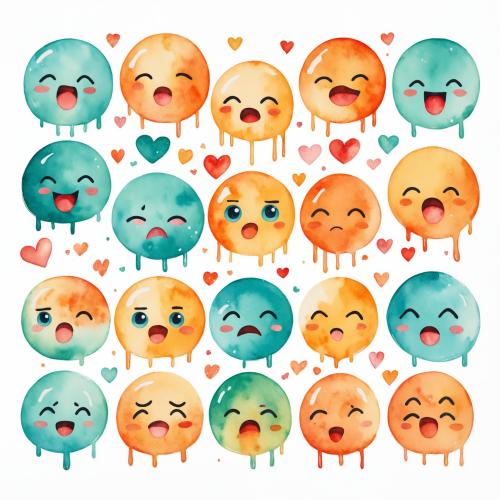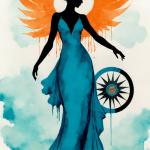If you've ever wondered why some readings leave you with profound insights while others barely scratch the surface, emotional intelligence might be the missing piece. Let's look at how tarot can help develop our emotional understanding, both of ourselves and others - without turning into amateur therapists or fortune-tellers.
Understanding Emotional Intelligence Through Tarot
Intelligence Quotient (IQ) measures cognitive abilities like problem-solving, pattern recognition, and logical reasoning. It's useful for understanding how someone might tackle abstract problems or learn new concepts. Emotional Intelligence (EI), on the other hand, measures our ability to recognise, understand, and manage emotions - both our own and others'. While IQ might help you solve a mathematical equation, EI determines how well you can navigate a difficult conversation or support a friend in crisis.
There are four key components to emotional intelligence:
- Self-awareness: The ability to recognise and understand your own emotions, including their triggers and impacts. This foundation allows you to notice when you're reacting emotionally rather than responding thoughtfully.
- Self-management: How well you can regulate your emotional responses and behaviour. This isn't about suppressing emotions, but rather choosing how to express them appropriately.
- Social awareness: The capacity to recognise and understand others' emotions and needs. This includes reading social cues and understanding group dynamics.
- Relationship management: The skill of using emotional awareness to build and maintain healthy relationships, including communication, conflict resolution, and boundary setting.
Tarot cards offer unique tools for developing each of these components. The High Priestess helps us tune into our intuition, while the King of Cups demonstrates emotional regulation in action.
Developing Self-Awareness
Self-awareness isn't just about knowing whether you're happy or sad - it's about understanding the complex tapestry of emotions that colour your experiences. The cards are fantastic tools for exploring our emotions and building our EI capabilities, offering prompts for deeper understanding and recognition of our emotional patterns.
Try this simple daily practice:
- Pull a card each morning
- Notice your immediate emotional reaction
- Ask yourself why you felt that way
- Track patterns over time
For example, if you consistently react negatively to the Three of Swords, what might that tell you about your relationship with grief or heartbreak? If the Ten of Wands makes you feel oddly relieved, perhaps it's highlighting where you need to set better boundaries.
Building Empathy Through Court Cards
The court cards offer a masterclass in understanding different personality types and emotional styles. Each court figure represents a different way of processing and expressing emotions:
- Pages: Open, curious, sometimes naive emotional expression. When reversed, they might show emotional immaturity or blocked learning.
- Knights: Active, sometimes impulsive emotional energy. Reversed Knights often indicate emotional charges in the wrong direction or misdirected passion.
- Queens: Mature emotional understanding and expression. Their reversals suggest emotional wisdom being blocked or used manipulatively.
- Kings: Mastery and control of emotional energy. Reversed Kings might show emotional tyranny or suppression.
Understanding these different styles helps us recognise and respect emotional diversity in our relationships. Not everyone processes feelings like a Queen of Cups, and that's perfectly fine. The reversals remind us that each emotional style has its shadow side - even the most emotionally mature person can have moments of regression or struggle.
Managing Emotional Reactions
When emotions run high, tarot can help us step back and gain perspective. Consider this spread for emotional regulation:
- Current emotional state (what you're feeling)
- Underlying trigger (what really caused it)
- Potential response (how you might handle it)
- Desired outcome (where you'd like to end up)
This isn't about suppressing feelings - it's about understanding them well enough to respond rather than react.
Practical Applications
The Emotional Check-In Spread
- Surface emotions (conscious feelings)
- Underlying emotions (subconscious feelings)
- What needs attention
- What needs expression
- What needs acceptance
The Relationship Insight Spread
- My emotional state
- Their emotional state
- The emotional dynamic between us
- Area for emotional growth
- How to improve communication
Finding Emotion in 'Unemotional' Cards
Some cards might seem purely practical or institutional at first glance, but they often carry subtle emotional insights. Here's how to interpret traditionally 'unemotional' cards in emotional contexts:
The Hierophant: While typically associated with tradition and institutions, this card speaks volumes about our emotional relationship with authority and conformity. In emotional readings, it might reveal feelings about fitting in, seeking approval, or the comfort (or discomfort) we find in established structures.
Four of Pentacles: Beyond its material associations, this card often points to emotional security needs. Are you holding tight to certain feelings out of fear? Is your need for control masking deeper emotional vulnerabilities?
Eight of Pentacles: The craftsperson's card might seem focused purely on work, but it carries messages about emotional satisfaction through mastery and the pride we take in our efforts. In emotional contexts, it might suggest the need for patient, consistent work on emotional skills.
Three of Pentacles: Though traditionally about collaboration and craftsmanship, in emotional readings it can reveal feelings about teamwork, recognition, and the vulnerability of sharing our work with others.
The Emperor: While representing authority and structure, this card often points to our emotional relationship with power - both wielding it and being subject to it. How do you feel about taking charge? About following others?
Ace of Pentacles: Not just about material opportunities, this card can speak to feelings of worthiness, emotional abundance, and our relationship with receiving good things in life.
When these cards appear in emotional readings, consider:
- Your emotional reaction to what the card represents
- How its energy might affect your emotional state
- What emotional patterns it might reveal
- Whether you're using practical matters to avoid emotional ones
Remember, every card in the deck has emotional layers - sometimes we just need to look a bit harder to find them.
Common Pitfalls to Avoid
Toxic Positivity
Not every card needs to be sunshine and rainbows. The Tower might be uncomfortable, but it's just as valuable as The Sun. Our so-called 'negative' emotions often carry the most important messages - anger can signal violated boundaries, fear might highlight genuine risks, sadness often points to what we truly value.
Over-Reliance on Cards
While tarot is brilliant for emotional insight, it shouldn't replace direct emotional experience. The cards are meant to enhance your emotional intelligence, not substitute for it. If you find yourself reaching for the cards rather than allowing yourself to be present with your emotions, it might be worth reading my article on tarot dependency, which gives detailed information on how to get back to having a healthy relationship with the cards.
Projection and Displacement
Be careful not to project your emotions onto others through the cards. Just because you drew the Five of Cups for someone doesn't mean they're grieving - they might just be ready to leave something behind.
Bypassing Genuine Feelings
Sometimes we use spiritual tools to avoid feeling difficult emotions. If you find yourself immediately reaching for your cards whenever you feel uncomfortable, you might be using tarot as an emotional bypass.
Integration and Practice
Building emotional intelligence through tarot is a practice, not a destination. Start small:
- Notice your immediate reactions to cards
- Practice describing emotional states without judgment
- Look for emotional patterns in your readings
- Use the cards to explore different perspectives
- Allow space for all emotions, not just the comfortable ones
Remember that emotional intelligence isn't about being perpetually calm or always knowing the right thing to say. It's about understanding and working with emotions effectively - both your own and others'.
The real power of tarot in emotional intelligence isn't in predicting feelings or finding quick fixes. It's in developing a richer emotional vocabulary, recognising patterns, and learning to dance with the full spectrum of human experience - even the bits that don't make it onto inspirational Instagram posts.
After all, every card in your deck, from the most joyous to the most challenging, has something to teach about the emotional landscape we all navigate. Even that Three of Swords you'd rather not see - perhaps especially that one.






